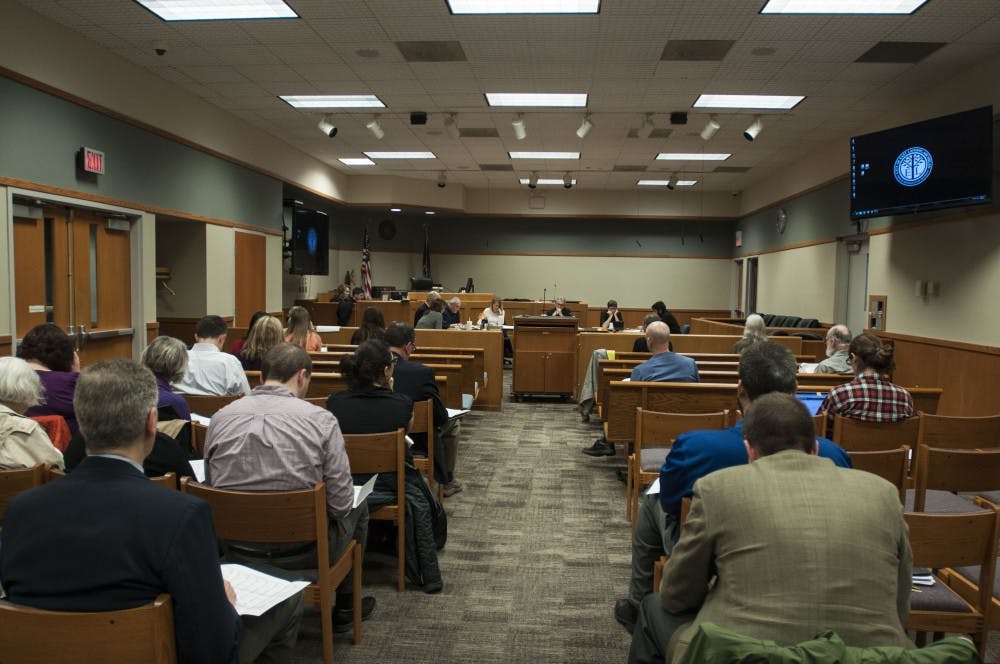A recently released report on residents' recommendations will help guide East Lansing officials as they navigate a budget crisis that could include cuts to city services and increased taxes.
About 860 resident surveys were collected online and at two community budget discussions, held on Jan. 10 and 18. The report analyzing those surveys was compiled by Lansing firm Public Sector Consultants.
Parking and Code Enforcement, or PACE, was the program residents most recommended face reductions, with 162 votes to cut the number of PACE officers in half. This was followed by reducing hours at the Aquatic Center, ending funding to the East Lansing Jazz Festival and ending filming of City Council meetings.
City Manager George Lahanas acknowledged the possibility cuts like those proposed to the PACE department could backfire, as fewer PACE officers would cut expenses but could also mean less ticket revenue. However, Lahanas said the larger issue would be a decreased ability to respond to nuisances in neighborhoods.
"Any time you're making a decision to cut an operation like PACE, you're risking that there will be more things that can't be addressed in neighborhoods," Lahanas said. "You won't be able to address as thoroughly the quality of life issues that come up."
Of the services residents voted as a "priority program" to continue receiving full funding in the face of potential cuts, there were 215 votes to keep the Hannah Community Center, compared to 56 residents who said they recommend closing it.
Public safety placed first in the ranking of residents' most valuable general service areas, followed by streets and waste disposal.
While residents seem to approve highly of the Hannah Community Center and the public safety department, both face potential cuts in Lahanas's proposed "no-revenue solution" in the event the city cannot secure new revenue streams.
The no-revenue solution calls for the closure of the Hannah Center and a reduction of eight fire department employees and nine police officers by 2020. The center's closure would save the city $1.01 million, while reductions to public safety would trim $1.53 million, according to Lahanas's report.
So many cuts have been made through the years that the city is simply running out of easy options, Lahanas said. This has forced the city into a decision that could pit two beloved programs against each other for funding.
"Hannah is a very significant expense, and if we do not make that cut, we would have to make even deeper cuts to public safety, which I think would put the community in a more unsafe position," Lahanas said.
Fifty-eight percent of residents recommended the city pursue both a mix of new revenue sources and service reductions, compared to nearly 30 percent who recommended only revenues and approximately 12 percent who recommended only cuts.
Despite the failure of the city's proposed income tax on the November 2017 ballot, the consultants found "strong implicit and explicit support" for new revenue streams, citing the lack of consensus on cuts and the fact that 88 percent of respondents supported some sort of revenue option.
Lahanas said the majority opinions of finding a mix of revenues and cuts could be challenging to implement in a way that residents would actually approve of.
"The difficulty is people are paying more, but they still might lose a service that they really like, so that could be very disappointing for some folks," Lahanas said.
In the report's conclusion, Public Sector Consultants found "a lack of consensus" on what services residents want to see reduced, and the cuts that did receive support would not yield significant savings for the city.
This lack of consensus doesn't decrease the usefulness of the study, but highlights the challenges the city will face as it nears the implementation of some cuts, Lahanas said.
"You're giving lots of opportunities to hear from your residents on very important things about how your government is functioning," Lahanas said. "The problem is, people value very different things. It's always difficult for governments to make reductions because if you're doing a service of any sort, it means people are relying on it and expect it."
Support student media!
Please consider donating to The State News and help fund the future of journalism.
Discussion
Share and discuss “Budget survey report shows what city services residents value most” on social media.







